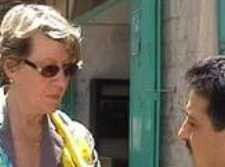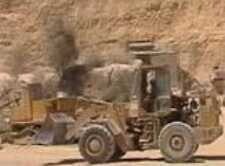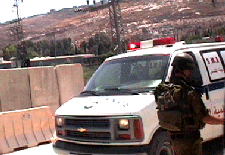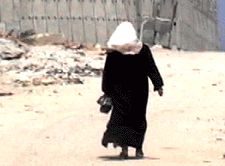The Electronic Intifada 16 July 2003
EI’s Arjan El Fassed facilitated a mission of prominent Dutch women to Israel and the occupied Palestinian territories which took place between the 7th and 12th of July. The mission was organized by United Civilians for Peace, a joint initiative of six Dutch peace and development organisations who have been working with their Palestinian and Israeli counterparts for many years in the field of development, peace building and human rights.

Tineke Lodders-Elfferich, chair of the women’s delegation said: “The core message of our counterparts is that to solve this conflict it is essential to recognize that international law is being violated. The Netherlands has an obligation to ensure respect for the international legal order. That obligation is also valid when it comes to our foreign policy with regards to the Israeli-Palestinian conflict.” Another aspect which the delegation found of great importance is the participation of women in all political processes in the area. Hanan Ashrawi stated: “Palestinian women have a special role. They were crucial in building Palestinian civil society. At the same time they are a vulnerable group.”

Tineke Lodders-Elfferich, chair of the delegation
During the evening, the delegation spoke with a number of leaders of the Palestinian women’s movement. They described from their own experiences and humiliations daily life with military roadblocks and the siege on Palestinian communities. The Israeli-Palestinian conflict is hardly analysed on its effects on women and women play hardly a role at the negotiation table. They urged for an international strategy against this consistent discrimination, oppression, and in favour of a significant role for women in the peace process.

Israeli bulldozers razing Palestinian lands
In Qalqilya, the delegation visited the so-called “security barrier” which on that spot has already been completed. The mayor of Qalqilya, Ma’ruf Zahran and Jamal Juma of the Palestinian environmental network (PENGON) explained the impact of the wall on the lives of the residents of Qalqilya, who are mostly dependent on agriculture. The wall encircles Qalqilya almost completely. The connection with the rural lands and the 32 villages in the area is lost. Only on the east side of the city is one road that provides access to the West Bank, but is closed by an Israeli military roadblock. The local economy has collapsed and around four thousand residents have already left the city. Some 50.000 Israeli settlers live in the area around Qalqilya. Israel will annex at least seven Israeli settlements in this area through the building of the wall. Jacobine Geel, a spokeswoman of the Dutch media, commented: “It’s bizarre to see that at the time people talk about the roadmap, on the ground the opposite is being accomplished by one of the parties. I wonder why the European Union support the roadmap, while at the same time it doesn’t do anything to stop this clear violation of international law.”

Ambulance prevented access at checkpoint in the West Bank
On Wednesday, July 9th, the delegation visited the Israeli parliament, the Knesset. The women spoke with Israeli parliamentarians representing three Israeli political parties. The meetings with the members Naomi Blumenthal (Likud), Colette Avital (Labour) and Ilan Shalgi (Shinui) provided a clear picture of the different trends that exist within Israeli politics. Naomi Blumenthal said she was an opponent to any Palestinian state. Colette Avital said that the occupation must come to an end, stressing the need to convince the Israeli public that there is a Palestinian partner in peace. Ilan Shalgi said that a number of settlements needed to be dismantled, but added that the large settlements should be kept in place. All three parliamentarians were against the implementation of the right of return of Palestinian refugees. Ozden Kutluer Yalim, member of the board of TYE International, said the meeting was interesting but provided not a lot of hope. “It is clear that most Israeli politicians are not ready to subscribe to the conditions of a just peace. I am afraid that without external influence we will never come to a just peace as long as Israel is the dominating party.”
In the afternoon, the delegation spoke with the Israeli organisation Mahsum Watch. This voluntary organisation monitors the attitude of soldiers at Israeli military roadblocks. The presence of these Israeli women sometimes effects the behaviour of soldiers vis-a-vis Palestinian civilians. The delegation was impressed with the conclusion of Mahsum Watch: “military roadblocks are a humiliation for Palestinians. They do not create security. On the contrary, these roadblocks are the cause of more violence and terrorism”, said chairperson Conny Jager. Afterwards, the delegation met with bereaved Israeli and Palestinian parents. The organisation Bereaved Parents was established by Yitzhak Frankenthal, who lost his son at an operation by Hamas. Israeli and Palestinian parents who lost their children during the conflict meet eachother and show that despite the great loss they have to deal with, reconciliation is possible. According to Frankenthal and his Palestinian colleague, dr. Adel Misk, there is a need for such activities because they give both sides a human face of the “enemy” and provides an example of both communities. The organisation calls for reconciliation and for international support for the peace process.

On Thursday, July 10th, the delegation visited a number of places in the Gaza Strip. The results of destruction since the eruption of the intifada are clearly visible. The main road to the south of Gaza has recently been reopened. The delegation travelled to Rafah and observed the amount of destruction that has been caused. The Israeli army has demolished hundreds of Palestinian homes in the south and the north. Daily invasions of the Israeli occupying forces during the past few months have turned life of civilians into a nightmare. Tiny van Hoeyen was personally touched by the difficult circumstances in which 700.000 residents of the refugee camps have to live. “It looks like an earthquake has taken place but reality is that this is a intentional strategy, which makes it more bitter.”
On Friday, July 11th, the last day of the visit, the delegation met with members of the Palestinian Legislative Council and were provided with briefings on the human rights situation by the Israeli human rights organisations B’Tselem and the Public Committee Against Torture in Israel. On Saturday, July 12th, the delegation returned back to the Netherlands.


